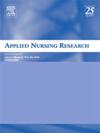Exploring EntrepreNursing: The influence of internal locus of control and organizational innovativeness on nurses' innovative behavior - A cross-sectional study
IF 2.2
4区 医学
Q1 NURSING
引用次数: 0
Abstract
Background
The concept of ‘EntrepreNursing’ improves healthcare outcomes by enhancing quality, accessibility, and cost-effectiveness, but remains underutilized by clinical nurses. Research on how to promote EntrepreNursing is scant.
Purpose
To examine how personal characteristics (internal locus of control, capacity to innovate) and organizational innovativeness influence nurses' innovative behaviors.
Method
A cross-sectional study of 205 registered nurses from diverse clinical settings completed a validated 62-item questionnaire measuring innovativeness and related factors.
Findings
The results revealed that internal locus of control strongly predicts innovative behaviors and correlates with organizational innovativeness. Nurses in managerial positions demonstrate significantly higher personal innovativeness. A combination of internal locus of control, personal innovativeness, and organizational culture explained 54 % of the variance in innovative behaviors.
Discussion
Findings suggest that strengthening nurses' internal locus of control through targeted organizational support and professional development may enhance healthcare innovation. Implementation strategies should focus on building both individual and organizational innovation capabilities.
探索创业护理:内部控制源和组织创新对护士创新行为的影响——一项横断面研究。
背景:“创业护理”的概念通过提高质量、可及性和成本效益来改善医疗保健结果,但临床护士仍未充分利用。关于如何促进创业护理的研究很少。目的:探讨个人特征(内在控制点、创新能力)和组织创新能力对护士创新行为的影响。方法:采用横断面研究方法,对来自不同临床机构的205名注册护士进行问卷调查,问卷共62项,测量创新性及相关因素。研究发现:内部控制源对组织创新行为有显著的预测作用,并与组织创新能力有显著的相关关系。管理岗位护士的个人创新能力显著高于管理岗位护士。内部控制、个人创新和组织文化的结合解释了创新行为中54%的差异。讨论:研究结果表明,通过有针对性的组织支持和专业发展来加强护士的内部控制点可以促进医疗保健创新。实施策略应侧重于建立个人和组织的创新能力。
本文章由计算机程序翻译,如有差异,请以英文原文为准。
求助全文
约1分钟内获得全文
求助全文
来源期刊

Applied Nursing Research
医学-护理
CiteScore
4.50
自引率
0.00%
发文量
65
审稿时长
70 days
期刊介绍:
Applied Nursing Research presents original, peer-reviewed research findings clearly and directly for clinical applications in all nursing specialties. Regular features include "Ask the Experts," research briefs, clinical methods, book reviews, news and announcements, and an editorial section. Applied Nursing Research covers such areas as pain management, patient education, discharge planning, nursing diagnosis, job stress in nursing, nursing influence on length of hospital stay, and nurse/physician collaboration.
 求助内容:
求助内容: 应助结果提醒方式:
应助结果提醒方式:


